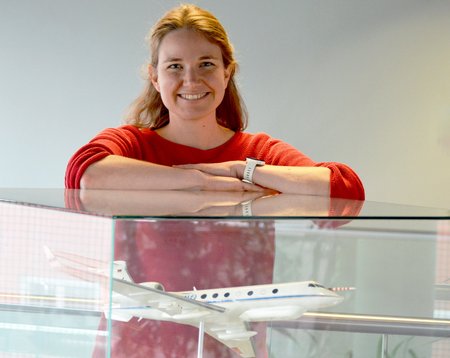Julia Windmiller becomes new group leader at the Max Planck Institute for Meteorology

Credit: MPI-M
About one-third of the world's precipitation falls within a narrow band of heavy precipitation known as the intertropical convergence zone (ITCZ). The ITCZ plays a central role in weather and climate in the tropics and structures the large-scale circulation. Despite its importance and large scale, current climate models have long shown biases in the representation of the ITCZ. To deepen understanding of this important atmospheric element and to improve its representation in a new generation of climate models, the group's work increasingly focuses on the role that tropical clouds play in structuring the ITCZ.
Convection and the Tropics
During her doctoral studies at Ludwig-Maximilians-Universität in Munich, Dr. Windmiller pioneered the application of methods from statistical physics to better understand which processes lead to the organization of deep convection and how this affects the climate. At the Max Planck Institute for Meteorology, her postdoctoral research focused on the organization of tropical convection and the analysis of data from atmospheric model simulations and observations. She performed climate simulations to uncover statistical relationships and develop a theoretical understanding of how tropical deep convection interacts with its environment. After a brief stint as a software consultant at an IT services and IT consulting firm, Dr. Windmiller has returned to the Max Planck Institute for Meteorology in January 2023 to take up the position as the group’s scientific leader.
On the move: Measurement campaigns
In addition to her theoretical expertise, Dr. Windmiller also brings practical experience from measuring campaigns which she co-led. She was co-cruise leader on board the research vessel FS SONNE whose (2021) “Mooring Rescue” cruise, serviced buoys in the tropical Atlantic while also making atmospheric measurements through the Atlantic ITCZ. In 2024, Dr. Windmiller will co-lead the deployment of the HALO research aircraft as part of the Max Planck Institute for Meteorology's international measuring campaign “Organized Convection Experiments in the Tropical Atlantic (ORCESTRA)”. During ORECESTRA , intensive soundings will be combined with active and passive remote sensing to investigate the properties of the clouds, circulations and air masses which form the ITCZ.
Further Information
Website of the Tropical Cloud Observations Group
Information about Barbados Cloud Observatory
Information about HALO the flying cloud observatory
Contact
Dr. Julia Windmiller
Max Planck Institute for Meteorology
julia.windmiller@mpimet.mpg.de
